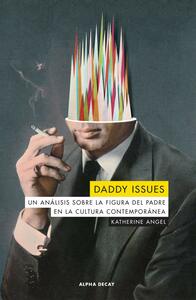Take a photo of a barcode or cover
The father is a subject that Angel identifies as largely forgotten from current feminist discourses even when systems of male domination are heavily discussed. Angel explores recent events and culture through the leans of the father, in particular how the father is the object and subject of desires and anxieties. Angel identifies the Father as a guarantor of a daughter's virtue and safety while simultaneously training her in the ways she will be socially dominated. I read the book in about 4 hours across two sittings and think it's a worthy read for anyone interested in feminist media/ literary criticism or theory-oriented readers looking for an interesting work on the father as a figure.
Very interesting in the beginning, makes you question a lot of these feminist dynamics related to fathers. But I felt like it started to derive a little bit from the topic, although it talked about parent relationships it also didn’t dive too deep on the daughter-father dynamics as I thought it would
informative
reflective
medium-paced
challenging
informative
fast-paced
In this book-length essay, Katherine Angel writes about putting the “patriarch” back in “patriarchy” by turning a critical eye to the role in the father in literature, art, and pop culture.
When this book opened with an epigraph from King Lear (“Nothing, my lord”) I KNEW it was going to slap. Then she brought up Ghost Wall and my Kindle annotations literally say “YES!!!!!!!” Hit after hit with Leave No Trace and The Water Cure! So rare that I read a piece of theory that references things I’ve actually read and seen, let alone loved. That all aside, I really enjoyed Angel’s analysis of the father. She writes in the radical feminist tradition without all the pollution of trans exclusion, which is sorely needed nowadays. Angel also treats aspects of “low culture” (comedy movies, TV shows, etc.) with the same careful attention as the works of Virginia Woolf, Donald Winnicott, and Sigmund Freud. My only complaint is that it could’ve been longer. Give me a full book, please! 4 out of 5 good daddies.
Era inevitable que llegase a leer este libro, pero me hubiera gustado saber algunas cosas antes de leerlo.
He disfrutado (quizá disfrutar no es el verbo más indicado, pero me entendéis) mucho leyendo este ensayo y he aprendido una barbaridad simplemente con el hecho de analizar obras escritas y audiovisuales desde otro punto de vista. Si es cierto que me he podido permitir una lectura más libre porque ya había leído previamente la mayoría de libros que analiza (las películas no me importa tanto que me las haya destripado), pero entiendo que esto sea un punto negativo para mucha gente porque son obras en su mayoría recientes. Es mucho más interesante leer estas 80 páginas sabiendo el argumento y desenlace de las siguientes novelas: Muro fantasma (de Sarah Moss), Apegos feroces (de Vivian Gornick), Tres Guineas (de Virginia Woolf) y The water cure (de Sophie Mackintosh). Me hubiera gustado mucho que la autora analizase también Una educación (de Tara Westover), que siento que encaja mucho con el hilo narrativo del ensayo.
A la mitad, da un giro que me ha desconcertado un poco. Si bien desde el principio se analizan las estructuras de poder que se estructuran desde el patriarcado (siempre con crítica feminista), hay un momento en el que se pasa a hablar del papel de las madres en la educación de les hijes. Me chocó mucho porque, aunque no deja de ser interesante y está inevitablemente relacionado, creo que el ensayo podría haberse estructurado de otra manera: quizá crear capítulos distintos para cada tema o similar.
También hay que tener en cuenta el contexto que engloba este libro: muy americano, muy heteronormativo (teniendo en cuenta sobre todo a las familias convencionales) y con una crítica de clase prácticamente superficial. Hay una breve mención a bell hooks al hablar de la mujer y el trabajo, pero he echado en falta una crítica sobre cómo la opresión familiar puede agraviarse en familias que disponen de menos recursos (puesto que sí habla de familias como la Virginia Woolf).
He disfrutado (quizá disfrutar no es el verbo más indicado, pero me entendéis) mucho leyendo este ensayo y he aprendido una barbaridad simplemente con el hecho de analizar obras escritas y audiovisuales desde otro punto de vista. Si es cierto que me he podido permitir una lectura más libre porque ya había leído previamente la mayoría de libros que analiza (las películas no me importa tanto que me las haya destripado), pero entiendo que esto sea un punto negativo para mucha gente porque son obras en su mayoría recientes. Es mucho más interesante leer estas 80 páginas sabiendo el argumento y desenlace de las siguientes novelas: Muro fantasma (de Sarah Moss), Apegos feroces (de Vivian Gornick), Tres Guineas (de Virginia Woolf) y The water cure (de Sophie Mackintosh). Me hubiera gustado mucho que la autora analizase también Una educación (de Tara Westover), que siento que encaja mucho con el hilo narrativo del ensayo.
A la mitad, da un giro que me ha desconcertado un poco. Si bien desde el principio se analizan las estructuras de poder que se estructuran desde el patriarcado (siempre con crítica feminista), hay un momento en el que se pasa a hablar del papel de las madres en la educación de les hijes. Me chocó mucho porque, aunque no deja de ser interesante y está inevitablemente relacionado, creo que el ensayo podría haberse estructurado de otra manera: quizá crear capítulos distintos para cada tema o similar.
También hay que tener en cuenta el contexto que engloba este libro: muy americano, muy heteronormativo (teniendo en cuenta sobre todo a las familias convencionales) y con una crítica de clase prácticamente superficial. Hay una breve mención a bell hooks al hablar de la mujer y el trabajo, pero he echado en falta una crítica sobre cómo la opresión familiar puede agraviarse en familias que disponen de menos recursos (puesto que sí habla de familias como la Virginia Woolf).
challenging
informative
reflective
fast-paced
informative
slow-paced
informative
reflective
challenging
informative
reflective
There were no really new ideas here, just a discussion of ideas that have already been put forward by other people. There were some interesting and thought provoking lines, but overall I thought the author's obsession with thinking all fathers want to screw their daughters a little weird.




